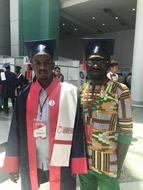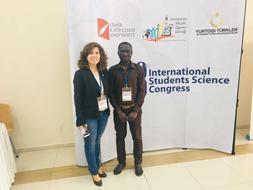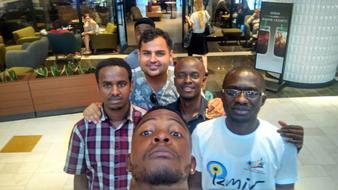Biography
Dr. Abubakari S. Sumaila earned his PhD in Statistics from
Yıldız Technical University, Istanbul, focusing on bioinformatics and melanoma research. His
dissertation, titled “Survival Modeling in Cutaneous Melanoma via Integrative
Transcriptomic and Epigenetic Bioinformatics” was based on the application of
advanced statistical methods in multi-omics modeling for novel biomarker
discovery and their translational potential. Abubakari’s academic interests
include survival analysis in medicine, sequential
decision processes, and statistical programming—particularly using R and
Python for data mining and translational research in biological systems.
Prior to enrolling for his doctoral studies, Abubakari served as an assistant
Biostatistics tutor at the School of Anesthesia, Komfo Anokye Teaching Hospital
(KATH). He has also taught various courses in Statistics, on a private basis.
While he was doing his graduate studies, he worked as a freelancer on
Fiverr,
where he primarily rendered services in data analysis using R and Python.
In his free time, Abubakari enjoys watching football, reading science fiction,
and photography.
Download my resumé.
- Bioinformatics
- Survival Analysis in Medicine
- Cutaneous Melanoma (CM) biology
- Complex high-dimensional modeling
- Sequential Decision Processes
- Machine Learning with
RandPython
-
PhD in Statistics (Biostatistics), 2025
Yıldız Technical University, Istanbul, Türkiye
-
MRes. in Statistics, 2019
Dokuz Eylül University, Izmir, Türkiye
-
BSc. in Statistics, 2013
University of Cape Coast, Cape Coast, Ghana
Recent Posts
Tutorials
Questions, solutions, projects …

Tutorial 2: Worked Examples
Solving selected problems around methods of moments, maximum likelihood, statistical independence etc.

External Project
Re-design Yildiz PhD thesis template in an Rmarkdown environment, inspired the r package thesisdown
Publications
Hi there!
Feel free to contact me for a possible collaboration.
- +90 541 726 35 38
- Gökalp, 38. Sk. No:8, Zeytinburnu, Istanbul, IST 34020
- From street 8, enter Building 1, room 116 on Floor 2
-
Monday 08:30 to 18:30
Wednesday 09:00 to 16:30 - Bluesky
- Twitter/X





























